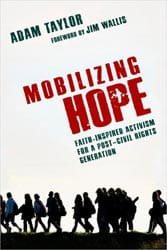 In Mobilizing Hope: Faith-Inspired Activism for a Post-Civil Rights Generation, Adam Taylor moves beyond tired theoretical debates over the role religion should have in the public square. Instead he argues for a fully incarnated faith that puts us to work with mind and heart, body and spirit, in all spheres of life.
In Mobilizing Hope: Faith-Inspired Activism for a Post-Civil Rights Generation, Adam Taylor moves beyond tired theoretical debates over the role religion should have in the public square. Instead he argues for a fully incarnated faith that puts us to work with mind and heart, body and spirit, in all spheres of life.
Taylor is not, of course, the first person to assert that activism can be a holy call, nor will he be the last; it is a truth that seemingly needs to be asserted and reasserted in every generation. He knows this, looking back to the civil rights movement for timeless truths that he then brings forward to apply to the struggles of our own day, such as the AIDS pandemic, poverty and profound economic inequality, and continuing racial injustice.
Taylor begins the book by quoting a sermon Martin Luther King Jr. preached on Paul's letter to the Romans, especially the call to "not conform any longer to the pattern of this world." As King preached, The saving of our world from pending doom will come, not through the complacent adjustment of the conforming majority, but through the creative maladjustment of a nonconforming minority.
Following Christ—and letting the Holy Spirit work in us to convert us and make us new—means breaking out of the mold that our culture and politics and even our family may have prepared for us. But that holy maladjustment isn't meant to just change us as individuals; it should reshape our relationships, our engagement in the world, the lenses through which we see our neighbors, our enemies, and the evening news. Taylor reminds us in the chapter "Following a Holistic Jesus," that Jesus was a revolutionary—not in the common secular understanding of the word, but because "to be revolutionary in discipleship terms is to make an allegiance with heaven and kingdom values. This primary allegiance will inevitably rub up against the ways of the world."
One common "rub point" may emerge if we try to raise issues of social justice in our churches; this can seem to some well-intentioned people of faith as "getting too political." The message, subtle or not, is that the church is to be about only charity, not change. Taylor makes a convincing case for resisting the ideological tendency to pit service and social justice against one another, as if, for example, feeding homeless people at a church soup kitchen and advocating for affordable housing legislation are inherently contradictory actions. Digging into the root causes of injustice, Taylor asserts, is a theological act, not a political one. Likewise, overcoming the barriers to being an active nonconformist—inertia, fear, apathy, self-doubt, and isolation—requires spiritual power.
Throughout the book, Taylor blends scriptural and theological reflection, personal stories, organizing techniques, and analysis of contemporary issues to show the wonders that giving ourselves over to creative maladjustment can do, for our faith and for our world. That said, while still relatively young, he is not naïve: He has participated in enough activist campaigns, social justice organizations, even a stint inside government, to have known failure and failings, and the toll that breaking the mold can take.
So in some ways the most important part of the book may be the conclusion, "A Lifetime Sojourn," in which Taylor reminds the reader that prayer, community, play, and contemplation are vital to being an activist who is in tune with God and able to make it for the long haul. "The goal of our work," he writes, "is to be a co-celebrant and co-creator with God, not to replace God in the work of kingdom building."
Read more about Adam Taylor and Mobilizing Hope at the Patheos Book Club.
2/3/2011 5:00:00 AM




